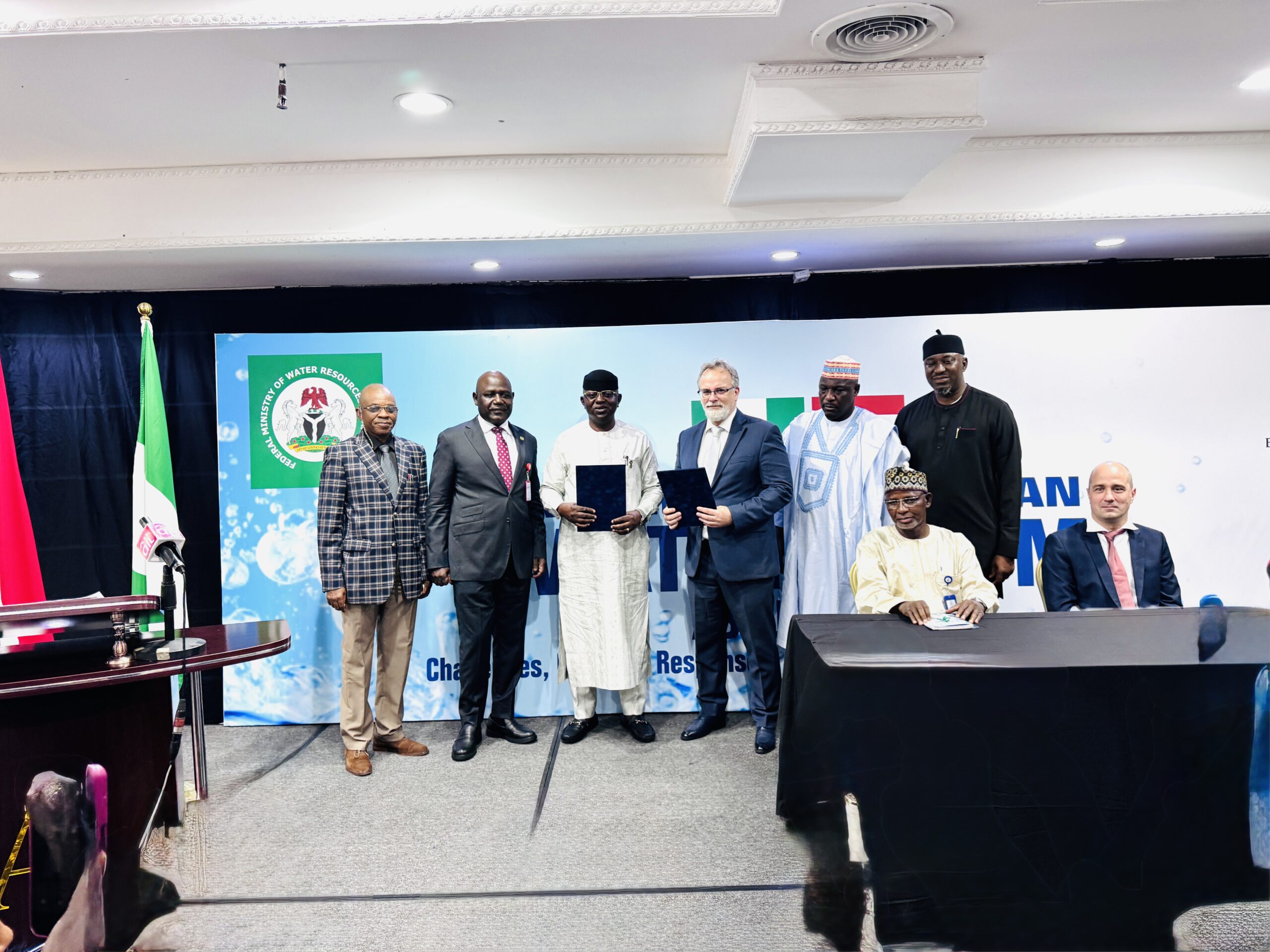By Tosin Kolade
Nigeria and Hungary have signed a Memorandum of Understanding (MoU) to strengthen academic and technical cooperation in water management, innovation, and climate resilience.
The agreement, signed between the Budapest University of Technology and Economics and Nigeria’s National Water Resources Institute (NWRI), Kaduna, was a key highlight of the Nigeria–Hungary Water Forum in Abuja on Tuesday.
The forum, attended by senior government officials, engineers, and researchers, aims to deepen collaboration in water management, technology development, and sustainable solutions to water-related challenges.
Nigeria’s Minister of Water Resources and Sanitation, Prof. Joseph Utsev, said the agreement marked a major step in improving technical capacity, research collaboration, and innovation in water resources development.
He said the partnership would support advanced training for Nigerian engineers, promote joint research on water security and climate adaptation, and enhance expertise exchange in flood control and basin management.
Utsev said the renewed engagement builds on the earlier MoU signed in November 2016, which established a framework for knowledge sharing and cooperation in water management.
“This forum builds on that foundation and takes our collaboration to a practical, result-oriented level.
“We are deepening cooperation through joint projects and innovations,” he said.
He noted that Nigeria faces complex water challenges worsened by rapid population growth, urbanisation, and climate change, including flooding and limited access to safe water in rural communities.
Utsev said the Federal Government, under President Bola Tinubu’s Renewed Hope Agenda, has prioritised water security and sanitation as part of national development and poverty reduction strategies.
“The Renewed Hope Agenda places water at the heart of our national strategy.
“We are implementing policies to achieve universal access to safe water and stronger flood resilience”.
He said the collaboration with Hungary complements ongoing projects such as the River Basin Revitalisation Programme and river training and flood control works along the River Niger and other basins.
According to him, Hungary’s experience in water engineering, wastewater treatment, and flood management would greatly benefit Nigeria’s reforms and infrastructure development in the water sector.
“This partnership is timely and visionary, it aligns with our drive to transform the water sector into a catalyst for diversification, food security, and climate resilience”.
Utsev reaffirmed Nigeria’s readiness to work with Hungarian companies to develop sustainable projects enhancing water supply, agriculture, and environmental protection.
“We are committed to creating a healthy policy environment, strengthening bilateral mechanisms, and supporting credible Hungarian firms entering Nigeria’s market,” he said.
“This cooperation represents a renewed partnership anchored in innovation, mutual respect, and a shared vision for a water-secured and climate-resilient future,” he added.
Earlier, the Hungarian Ambassador to Nigeria, Mr Lóránd Endreffy, said the forum was a milestone in the partnership between both nations and reaffirmed Hungary’s readiness to share its expertise and technology with Nigeria.
He said Hungary’s advanced water infrastructure and long-standing engineering tradition made it a reliable partner in Nigeria’s efforts to transform its water sector.
Endreffy acknowledged the magnitude and complexity of Nigeria’s water-related challenges, which he said were intensified by rapid population growth, urbanisation, and climate change.
He noted that periodic flooding continued to cause serious disruptions, especially in densely populated and flood-prone areas, while access to safe drinking water and sanitation remained a core development priority.
“These challenges do not signify weakness, they reflect Nigeria’s ongoing transformation and determination to pursue innovative and sustainable solutions”.
He added that Hungary’s expertise in flood management, water engineering, and treatment technologies could complement Nigeria’s experience and support its progress in strengthening the water sector.
“This is not a one-off event but a launchpad for long-term, mutually beneficial cooperation between our countries,” Endreffy said.
NAN reports that the Nigeria–Hungary Water Forum seeks to address Nigeria’s water challenges by showcasing Hungarian innovations through technical sessions and case studies on water security and rural supply.
The event aims to strengthen bilateral cooperation, promote technology exchange, and renew both countries’ commitment to sustainable water management.
Highlights of the forum included presentations from the National Emergency Management Agency, Nigeria Hydrological Services Agency, National Water Resources Institute and the Budapest University of Technology and Economics.
The thematic sessions were on flood control, climate adaptation, rural water supply, and emergency preparedness and management to promote knowledge exchange and innovation. (NAN)
Edited by Abiemwense Moru













Thanks for sharing. I read many of your blog posts, cool, your blog is very good.